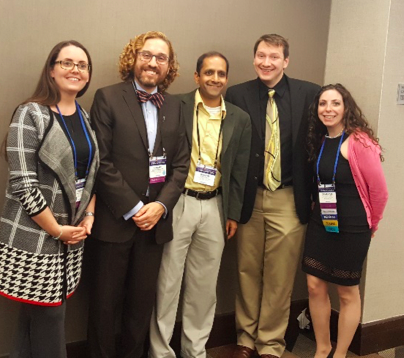By: Sam Giordano on behalf of the Trainee Council
Finding a good mentor is challenging…
Being a good mentor is just as challenging, but 2016 SfRBM Mentoring Excellence Award Winner, Dr. Rakesh Patel, a Professor in Pathology from the University of Alabama at Birmingham fits the bill. In fact, Dr. Patel excels at mentoring, but I may be a bit biased having been lucky enough to be his mentee during my graduate training.

We all learn from our mentors, and Dr. Patel said the best advice he received as a mentee was to “always persevere, even when experiments don’t work.” He continued, “always ask questions, be critical of your own work, as well as others and most of all enjoy what you do.”
Dr. Patel hopes that as he mentors his trainees, he continues teaching his mentees these important lessons. He also recommends that when trainees are looking for a mentor, look at your potential mentor’s mentoring track and their mentor’s mentoring track record; it can give great insight into the type of mentor they are and how they support their trainees.
In receiving the 2016 SfRBM Mentoring Excellence Award, Dr. Patel received numerous nomination letters from trainees (and even faculty) from different countries with diverse experiences and backgrounds. When I asked how he mentors such a diverse group of people his advice fit perfectly into the current trends in medicine and science. “To borrow a current buzz term, I always try to ‘personalize’ mentoring. I use the analogy that whatever parenting approach was successful for my older child, rarely works for my youngest, and vice versa.”
Dr. Patel also reminds us that a good mentor considers professional and personal goals of their mentees and takes the time to understand what motivates them. This can help the mentees harness his or her strengths and overcome their weaknesses. He also points out that as the trainees grow and learn, the mentor-mentee relationship will evolve, hopefully in a mutually beneficial way. In a healthy mentor-mentee relationship, honest and open communication is key, and it is the best way to have a successful and long lasting healthy mentoring relationship.
— Published